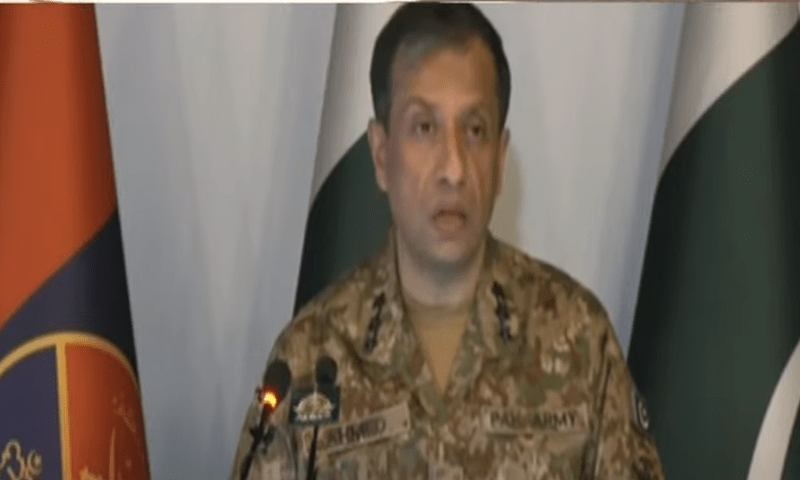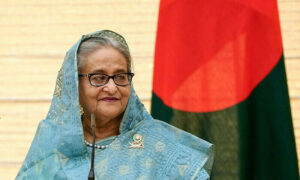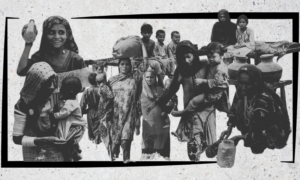Inter-Services Public Relations (ISPR) Director General (DG) Lieutenant General Ahmed Sharif said on Monday that a “massive, illegal political mafia” in the country was trying to sabotage the state’s Azm-i-Istehkam operation to fulfil its vested interests.
Addressing a press conference in Rawalpindi, he said its purpose was to “clarify the army’s stance on some important topics”, adding that there was some “increase in organised propaganda, false, wrong news and concocted news” against the armed forces in recent times.
“That is why it is important to talk on these matters.”
Providing updates on counter-terrorism operations so far in the year, he said 22,409 intelligence-based operations were conducted against terrorists and their facilitators.
He said over 112 operations were being conducted daily by the military and law enforcement agencies against terrorism.
Responding to a question regarding the potential of displacement in key areas as a result of the government’s new planned operation, Azm-i-Istehkam (Resolve for Stability), DG Ahmed said that it was a “comprehensive counter-terrorism campaign” through national consensus and “not a military operation per se as it is being presented”.
He further said: “I will start by saying that our problem is that we are sacrificing even very important issues on the altar of politics and Azm-i-Istehkam is one such example of this.”
DG Ahmed said that a narrative was built to give the impression that the operation was launched to displace people, clarifying that it was only for the purpose of “reinvigorating the already in-place National Action Plan”.
He said kinetic efforts already under way would be “augmented” by law enforcement agencies empowered by effective legislation, as per the original announcement of the operation.
Referring to the original announcement, the DG ISPR questioned where it pointed to previous military operations.
“Our issue is that we make every important issue … a joke because of our politics,” he reiterated.
The DG ISPR said that a “very strong lobby” did not want the objectives of the National Action Plan to be fulfilled “because the stakes in [sabotaging] operation are very high and it’s not based on any ideology but involves a lot of money”.
“A massive illegal, political mafia rose to sabotage the operation and the first move of that mafia was to make the operations controversial through false and fake arguments.”
Pointing to the National Action Plan’s 14 points, he said kinetic operations were “under way in a splendid manner” with “four to five operations under way in every hour”.
He said the problem was present in the plan’s other points. DG Ahmed said it was decided in 2014 and 2021 that Counter-Terrorism Departments would be established at the provincial levels and they would be responsible for leading operations against terrorism.
The DG ISPR said the National Action Plan also talked about the regularisation and registration of religious seminaries but only a bit over 16,000 were and thus the status of 50 per cent was unknown.
“Does the army have to do this?” he questioned.
The DG ISPR said that all political parties had also decided to end the “illegal spectrum”. “This illegal spectrum is felt and seen everywhere in daily life and it hides a major illegal economy through which the criminal system and terrorism operate,” he explained.
He said the requirement of the illegal spectrum was a “soft state” and the solution to it was the National Action Plan, adding that eliminating the illegal spectrum would lead to societal benefits overall instead of solely curbing terrorism.
“There is a vested interest that doesn’t want this to happen and they’re making a lot of money.”
He said if Operation Azm-i-Istehkam was properly acted on, it would not only eliminate terrorism but also lead to societal and national uplift.
Questioned about the weekend’s violence during a peace rally in Bannu and the alleged firing by security forces, DG Ahmed mentioned last week’s terrorist attack on Bannu Cantonment that martyred eight military personnel.
He said the locals had demanded carrying out a peace march the next day and it was agreed that there would be no anti-state slogans carried out. “But when the peace march began, some specific negative elements joined with it,” he added.
More to follow.







